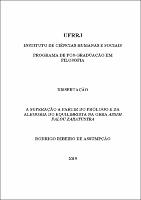Please use this identifier to cite or link to this item:
https://rima.ufrrj.br/jspui/handle/20.500.14407/13497| Tipo do documento: | Dissertação |
| Title: | A superação a partir do prólogo e da alegoria do equilibrista na obra Assim falou Zaratustra |
| Other Titles: | The overcoming from the prologue and allegory of the equilibrist in the work Thus spoke Zarathustra |
| Authors: | Assumpção, Rodrigo Ribeiro de |
| Orientador(a): | Carvalho, Danilo Bilate de |
| Primeiro membro da banca: | Carvalho, Danilo Bilate de |
| Segundo membro da banca: | Costa, Affonso Henrique Vieira da |
| Terceiro membro da banca: | Moraes, Francisco José Dias de |
| Quarto membro da banca: | Barros, Tiago Mota da Silva |
| Keywords: | Superação;Morte de Deus;Vontade de poder;Niilismo;Super-homem;Eterno retorno;Overcoming;Death of god;Will to power;Nihilism;Superman;Eternal return |
| Área(s) do CNPq: | Filosofia |
| Idioma: | por |
| Issue Date: | 3-Dec-2019 |
| Publisher: | Universidade Federal Rural do Rio de Janeiro |
| Sigla da instituição: | UFRRJ |
| Departamento: | Instituto de Ciências Humanas e Sociais |
| Programa: | Programa de Pós-Graduação em Filosofia |
| Citation: | ASSUMPÇÂO, Rodrigo Ribeiro de. A superação a partir do prólogo e da alegoria do equilibrista na obra Assim falou Zaratustra. 2019. 97 f. Dissertação (Mestrado em Filosofia) - Instituto de Ciências Humanas e Sociais, Universidade Federal Rural do Rio de Janeiro, Seropédica, 2019. |
| Abstract: | O objetivo geral da dissertação é oferecer um entendimento do que seja o conceito de superação a partir do Prólogo de Assim Falou Zaratustra, obra do filósofo alemão Friedrich Nietzsche. Com esse interesse, fez-se um estudo detalhado do Prólogo no qual se buscou analisar, em cada um dos dez parágrafos, os temas e conceitos centrais, para que, por fim, fosse possível verificar como cada tema ou conceito se dispõe a favor da superação da personagem Zaratustra. Todavia, destaca-se exacerbada importância à alegoria do equilibrista, que pode ser dita uma analogia aos perigos e aos riscos envolvidos no caminho da autossuperação. Para tantos objetivos e interesses, este trabalho está estruturado do seguinte modo: o primeiro capítulo, no qual se explora os §§1 e 2 do Prólogo, está dedicado à análise dos seguintes temas: a transformação e o declínio de Zaratustra e a morte de Deus; o segundo capítulo, que trabalha sobre os §§3, 4 e 5 do Prólogo, está aplicado à análise das anunciações de Zaratustra dos seguintes temas: o super-homem, a vontade de poder e o niilismo do últimohomem; o terceiro capítulo, empenhado aos §§6, 7, 8, 9 e 10 do Prólogo, devota-se à sondagem do fracasso e das novas experiências de Zaratustra. O objetivo final desses três capítulos é fundamentar as bases para a proposta hermenêutica oferecida no quarto e último capítulo: uma especial atenção à análise e interpretação da alegoria do equilibrista, evidenciando-a como um artifício pedagógico sobre o caminho da superação |
| Abstract: | The general objective of the dissertation is to offer an understanding of the concept of overcoming from the Prologue of Thus Spoke Zarathustra by the German philosopher Friedrich Nietzsche. With this interest, a detailed study of the Prologue was made, in which one tried to analyze, in each of the ten paragraphs, the central themes and concepts, so that, finally, it was possible to verify how each theme or concept are in favor of the overcoming of the character Zarathustra. However, we made attention to the allegory of the equilibrist, appointing an analogy that can be made to the dangers and risks involved in the path of selfovercoming. For so many objectives and interests, this work is structured as follows: in the first chapter, in which §1 and §2 of the Prologue are explored, is dedicated to the analysis of the following themes: the transformation and decline of Zarathustra and the death of God; the second chapter, which deals with §§3, 4 and 5 of the Prologue, is applied to the analysis of Zarathustra's annunciations of the following themes: superman, the will of power, and the nihilism of the last man; the third chapter, committed to §§6, 7, 8, 9 and 10 of the Prologue, devotes itself to probing the failure and new experiences of Zarathustra. The final objective of these three chapters is to lay the foundations for the hermeneutic proposal offered in the fourth and last chapter: a special attention to the analysis and interpretation of the allegory of the equilibrist, evidencing it as a pedagogical artifice on the path of overcoming |
| URI: | https://rima.ufrrj.br/jspui/handle/20.500.14407/13497 |
| Appears in Collections: | Mestrado em Filosofia |
Se for cadastrado no RIMA, poderá receber informações por email.
Se ainda não tem uma conta, cadastre-se aqui!
Files in This Item:
| File | Description | Size | Format | |
|---|---|---|---|---|
| 2019 - Rodrigo Ribeiro de Assumpção.pdf | 2019 - Rodrigo Ribeiro de Assumpção | 1.31 MB | Adobe PDF |  View/Open |
Items in DSpace are protected by copyright, with all rights reserved, unless otherwise indicated.

